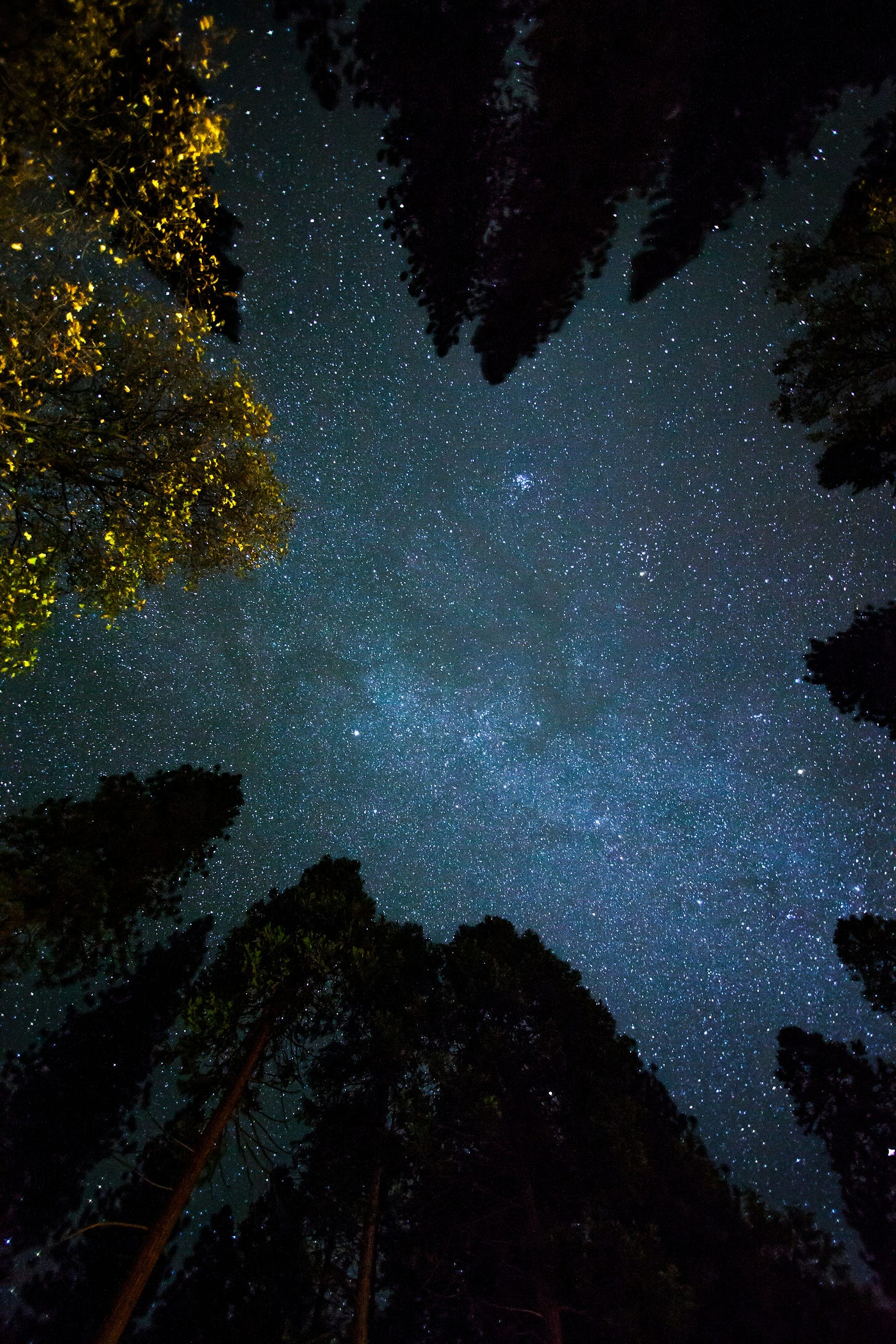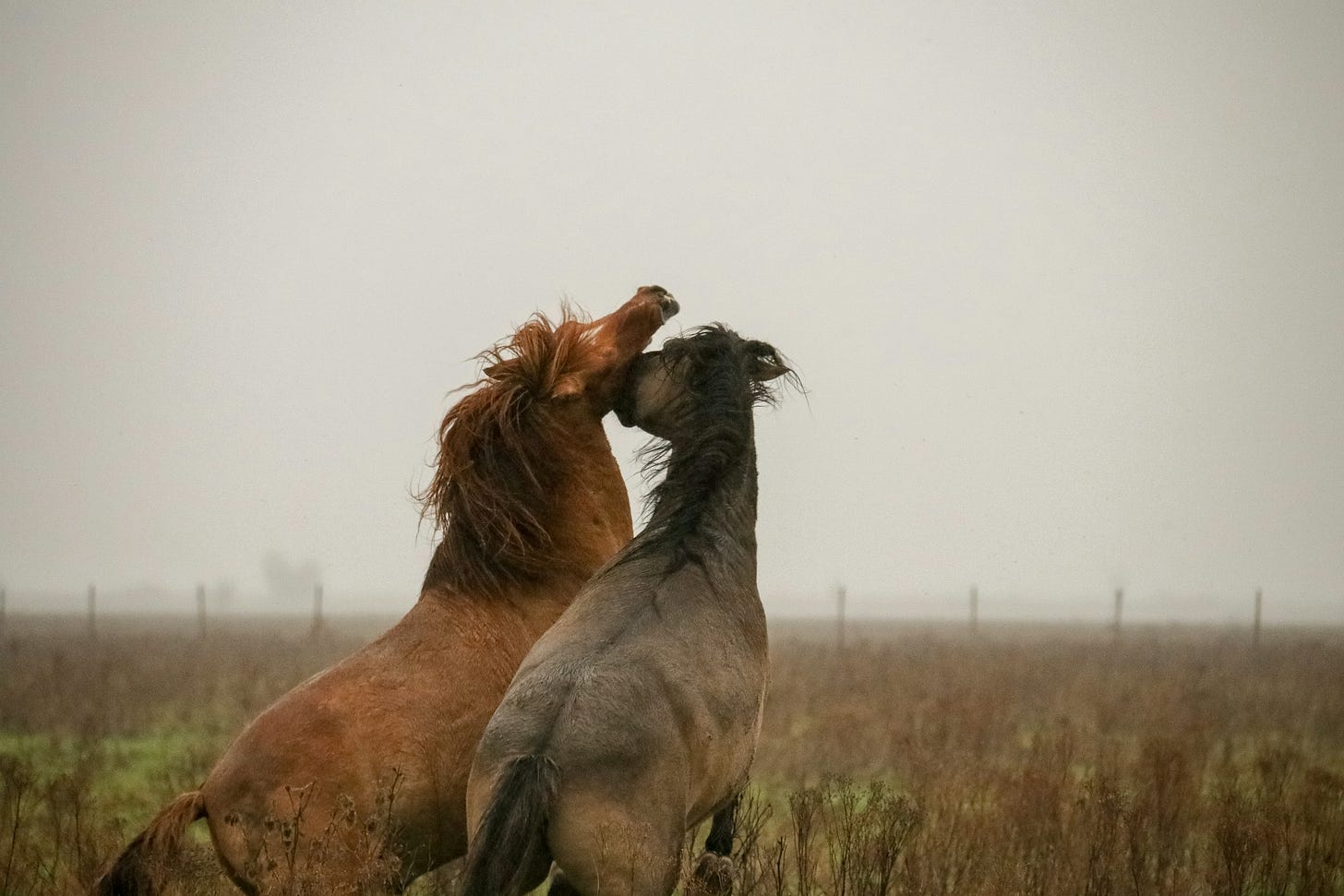The bright horses have broken free from the fields
They are horses of love, their manes full of fire
They are parting the cities, those bright, burning horses
And everyone is hiding, and no one makes a sound
—Nick Cave, “Bright Horses”
Put on your shoes, grab a jacket. There’s something outside you need to see. Resist the urge to illuminate the night with your phone. Lie down. Let the cool earth press against your back. Look up. What do you see?
Stars, you might answer. Many or few, depending on the encroachment of city lights and whether the moon is full or sickle thin. But what are stars? What are you actually looking at?
You might rummage in the dusty files and cabinets of your mind for half-remembered science lessons: balls of gas, celestial bodies, bright nuclear forges, impossibly distant. Or, for the more literary-minded, other words might surface: worlds, orbs, realms, vast silences, Joyce’s “ghostfires”, Hopkins’s “fire-folk.”
Or you might see something else entirely. If you’re astrologically inclined, the stars are bright coordinates of fate mapping the intricate paths of our lives. A medieval observer might imagine marvellous creatures in a choreographed cosmic dance.
But strip away the layers of interpretation. What remains? Points of light suspended in darkness. That’s it.
Here’s the crucial thing: the meaning of the natural world is not simply there on the surface waiting to be read. Nature is not self-interpreting. We are not passive spectators, but actively make meaning of what we see. And this is true not just with stars but with trees, soil, oceans, birds, plants, animals, the whole mad chorus of living and non-living things. What we see and what we fail to see depends a great deal on our imaginative framework: the set of deep-buried assumptions and beliefs shaped by our habits of attention, our education, our culture, and history.
This act of interpretation, however, is not neutral. The lenses through which we see nature shape our actions within it.
At the heart of our modern predicament is a crisis of vision. Our eyes have degenerated into “brain tumours,” laments John Moriarty. Strong drink language that, but necessary. A fully modern person looks at nature and sees something outside of him or herself, empty of meaning and purpose except what humans give it, a “standing reserve” (Heidegger) of natural resources awaiting our use. Trees become timber, cows, milk, mountains, ore, oceans, playgrounds. And this degenerated seeing has given rise to ugly ways in the world. We consume the earth with no sense of its needs or limits—like wide-jawed and salivating monsters from an old story—guided only by the artificial and now flickering lights of our projects and plans.
To walk beautifully upon the earth, we need to learn to see differently. We need healing. We need wise hands—to borrow a biblical image—to mix mud and spit and form a paste to place on our eyes. And this is where, for me, the Christian doctrine of creation offers hope.
The word “doctrine” might evoke hushed silences among dusty books, but it simply means a description of Christian convictions. The Christian doctrine of creation, I want to argue, can help us learn to see clearly. It is an imaginative lens through which we make sense of the world, a map for navigating the complexities of our lives. Lost in thickets of our own making, we need a map to orient ourselves, to show us the way. The Christian tradition offers a vital corrective to our current crisis—a better way of seeing, a salve of mud and divine spit.
But there’s an immediate issue. It’s not always obvious that Christianity offers a better vision. Critics often accuse Christianity of distorting our relationship with the natural world, separating humans from a natural order they are licensed (given dominion) to exploit. It is claimed that Christianity breeds indifference and ingratitude, motivates ugly ways in the world. From a historical perspective, there is a mix of truth and falsehood in these claims, but my purpose here isn’t historical analysis. Instead, I will suggest in this series that where Christianity has borne fruits of indifference and ingratitude, it has failed to live out of the soil of its core convictions. A Christianity indifferent to creation is a mutilated Christianity.
But I have a more personal concern. Frankly, many Christians seem strangely disinterested in creation, neither moved by grief nor stirred to wonder. We have become, in Christopher Thompson’s wonderful and troubling phrase, “indoor Christians.” Our faith—what we talk about, pray about, sing about, learn about—seems to say little about the natural world other than God made it.
We’ve disenchanted our faith, domesticated it, penned the bright horses of spiritual imagination into quiet fields. Practically, we often live as if the world is as modernity claims, simply a machine carrying on its routine and predictable business unless God disrupts the normal course of events in some miraculous act. Only then does the natural world become interesting to our faith, as if God needs to intrude to make things holy. Thomas Aquinas recognised this centuries ago:
Some hold that our views about creatures are irrelevant to the truth of the faith so long as our religious attitude is correct. They have adopted a thoroughly unsound position.
Many Christians have adopted this unsound position. But this mechanistic and largely materialistic view is a poor inheritance. It leaves many thinking and feeling Christians with a deep sense of boredom, of unreality and dissatisfaction.
And everyone has a heart and it's calling for something
And we're all so sick and tired of seeing things as they are
And horses are just horses and their manes aren't full of fire
The fields are just fields and there ain't no Lord
Some of us feel beneath our feet and in the air a great unsettling in the world, a shifting of the ground, a swirling of currents that our faith seems ill-equipped to address. We experience fears, longings, complexities, wonders, mysteries, beauties, tragedies, and glories that we don’t know what to do with. These experiences flicker at the edges of our awareness, peripheral to what we’ve been told all our lives to focus on. Many Christians find their faith too small, too stifling or fragile—too unsound—to hold the complexities of lived experience. An indoor faith cannot speak to our grief, our wonder, our longing. It cannot speak to the deep things of our lives and the deep needs of our times. We yearn for more, for wise hearts, for deep encounters with the world. We long for a re-enchanted, re-wilded faith.
And everyone has a heart and it's calling for something
And we're all so sick and tired of seeing things as they are
I wonder if something is going on. We no longer live in a world where a small faith can offer much comfort. I wonder if God is at work troubling our cosy, indoor faith.
The bright horses have broken free from the fields
They are horses of love, their manes full of fire
They are parting the cities, those bright, burning horses
I believe many of us resonate with Martin Shaw’s yearning for “a Christianity as huge as this forest. As magnificent as the stars that swirl over it every night. As endless as the River Dart I hear rushing past.”
So, what to do with this longing? We need to take our indoor faith outside. This is the fire that lights this series.
Creation is the context God has given us for our lives. Its cycles, forces, wonders, tragedies, beauties, vastness, and complexity offer a canvas large enough to hold the fullness of human experience and something of the strange, unsettling glory of God. But we need to re-learn how to see creation well, to cultivate a sense of the cosmos and our place within it. This is the Christianity I want to invite you into in this series, that I want to discover and know all the days of my life.
This is a work of recovery, not of invention. Stored up in the great storehouses of the Christian faith, stored up over long years, are great resources to help us relearn our being in the world. Christian doctrine offers standing stones, points of navigation to guide us back to a right relationship with the natural world. Wendell Berry distinguishes between a path and a road. A path arises from intimacy with a place, while a road cuts its way through a landscape, imposing itself. The way revealed to us by Christian doctrine is not a road but a path, a way of waking with creation, not imposing our will on it. It responds to the world not as we wish it to be but as it is, God-made and gifted.
This series explores the Christian doctrine of creation, seeking to understand our place within the cosmos. It's about learning to see—and in seeing differently, learning to live differently. We will delve into the specific tenets of this doctrine, uncovering what the Christian tradition truly believes about the natural world and our relationship to it. Perhaps, in doing so, we can begin to hear again the thunder of bright horses, their manes aflame with a love that still sets the world alight.




Sheesh. Cryin’ a tear at the impact of this. Also, “habits of attention” - I am always grateful to be reminded attention is a habit to cultivate.